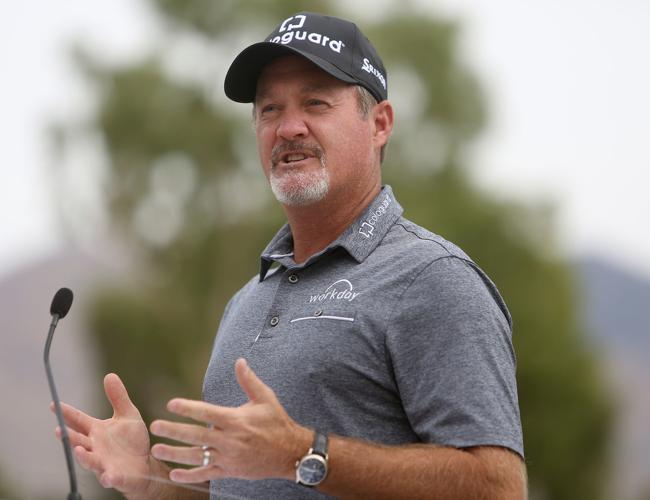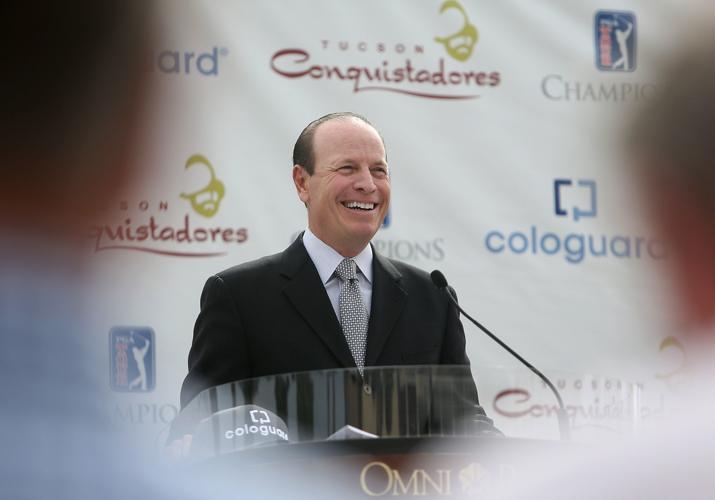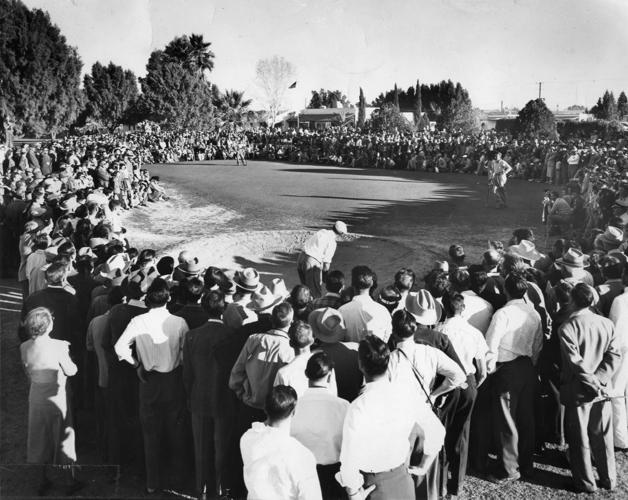For 50 years, the Tucson Open has been sponsored by people who sold cars, phones, watches, electricity, TV programming and whatever it is Accenture does.
For the last three years, the Tucson Open — known as the Tucson Conquistadores Classic — sold golf.
It was played by men 50 and over, slotted against and almost buried by the mighty NCAA basketball tournament, and for a long time people worried that a sponsor-less Tucson Open would go the way of spring training, minor-league baseball and the Pro Bowler’s Tour.
Get. Go. Gone.
Those G words were used Tuesday by soon-to-be Champions Tour rookie of the year Jerry Kelly and they had nothing and everything to do with the rebranding of pro golf in Tucson.
He wasn’t talking about golf. He was talking about beating cancer.
Beginning March 2, the Cologuard Classic will make its debut on the Champions Tour at the esteemed Tucson National Golf Club.
Cologuard Classic? It doesn’t sound like a golf tournament. It isn’t instantly identifiable, like the Bass Pro Shops Legends of Golf, or the Pacific Links Bear Mountain Open.
Cologuard? It’s a use-a-home, noninvasive screening test created by Exact Sciences, a Wisconsin firm whose mission is to eradicate colon cancer.
“March is Colon Cancer Awareness Month in America,” said Kelly, 50, who has been playing in the Tucson Open, by any name, for the past 20 years.
“One of the reasons I am representing Cologuard is because these guys know what they’re doing and they’re not beholden to a bottom line.
“They want to get rid of colon cancer. Only one out of three Americans over 50 get tested for colorectal cancer. Our goal to get the word out and make it so there’s no excuse any more. Get. Go. Gone.”
Cologuard and the Champions Tour make a lot more sense than, say, the Dick’s Sporting Goods Open.
At noon Tuesday, sitting in idyllic weather near the 18th green at Tucson National, a few yards from where Arnold Palmer, Lee Trevino, Johnny Miller and Phil Mickelson won Tucson Open championships, PGA Tour president Greg McLaughlin spoke not about golf but about the partnership between Cologuard and the Tucson Conquistadores, a charitable group that has raised more than $32 million for Southern Arizona charities over the last 51 golf seasons.
“It just makes sense,” he said. “Do you realize that over the last 20 years, the number of people to die from colon cancer in America hasn’t changed? That’s why we are so encouraged by our relationship with Cologuard. We can help stop a killer.”
The PGA Tour was active in putting the Conquistadores and Cologuard together. The Tour spent almost three years searching for a sponsor for a Tucson event, subsidizing the Conquistadores so they could pay $1.7 million in prize money and still award hundreds of thousands of dollars to charities.
“The Tour didn’t want us to go away,” said Judy McDermott, executive director of the Conquistadores. “We’ve signed a three-year contract, and we’ve now got a date that doesn’t conflict with UA basketball or the NCAA tournament. It all worked out.”
Initially, when the WGC-Accenture Match Play Championships moved from Dove Mountain to San Francisco after the 2014 golf season, the Tour asked the Conquistadores if they would play host to the Charles Schwab Cup, the equivalent of the PGA Tour’s FedEx Cup championships.
The Schwab Cup will be held this weekend at the Phoenix Country Club, and it would’ve been a terrific fit for Tucson. Golf in November? Yes, please.
But the Conquistadores declined a higher-profile event because the Schwab Cup is limited to the top 36 players on the Champions Tour. That means the money-generating Pro-Ams in the days before a tournament begins are limited to 36 foursomes.
The Cologuard Classic will include 80 golfers. That means the Conquistadores can more than double their money by playing Pro-Ams on the Wednesday and Thursday of tournament week.
That Pro-Am money is distributed to dozens of Tucson sports programs, from soccer to softball, assisting, for example, a rising Tucson wrestling star to attend a national championship meet in Pennsylvania.
Jose Rincon, president of the Conquistadores, said he was unable to sleep Monday night, so eager to get to Tuesday’s announcement that “I came here giddy.”
“We’re not just crossing off the box with a title sponsor,” he said. “We’re crossing the right box. Exact Sciences has a partnership with the Mayo Clinic. The credibility of their science and product tells me we’re getting on the right bus.”
All aboard.







